- 現在位置
- トップ > 白書・統計・出版物 > 白書 > 文部科学白書(英文) > 2019年 文部科学白書(英文) > Special Feature 2:History and Legacy of Rugby World Cup, Japan 2019
Special Feature 2:History and Legacy of Rugby World Cup, Japan 2019
Section 1 General Remarks
The Rugby World Cup 2019 Japan (here in after referred to as “RWC 2019 Japan”) was held at 12 venues across Japan from September to November 2019.
The success of the RWC 2019 Japan tournament inspired Japan a lot due to the Japanese team’s performance in the tournament, and it significantly impacted society. Moreover, as the first Asian host country and not one of the traditional rugby nations, Japan attracted much attention worldwide, including the Asian region.
The tournament was managed smoothly and concluded successfully, thanks to the great efforts of the Rugby World Cup 2019 Organizing Committee (hereinafter referred to as the RWC Organizing Committee) and the host cities, not to mention the success of the Japanese national team. Ticket sales and attendance were also favorable, with approximately 1.84 million tickets sold out of the final 1.853 million saleable tickets. This resulted in a sales rate of around 99.3% (including the three pool matches canceled). The total attendance was 1,704,443, with an average attendance of 37,877 per match (excluding the three pool matches canceled). Many people from Japan and abroad visited the 16 fan zones set up in various host cities across Japan, and the total number of visitors, including all the venues, was 1,137,288 during the tournament period. Beyond merely watching the matches, the interaction at the fan zones provided a great opportunity for fans from Japan and abroad to connect. The ticket sales rate and fan zone attendance are the highest ever recorded at the Rugby World Cup.
This Special Feature summarizes the outline and results of the RWC 2019 Japan and reflects on the success of the Japanese national team, which was the first Asian team to reach the final eight. The Special Feature also introduces MEXT’s efforts to create momentum for the tournament’s success, the efforts of local governments, and the efforts toward the popularization of Rugby in the future, as part of the tournament’s legacy.

His Imperial Highness Crown Prince Akishino declared the tournament ope

Opening ceremony
Section 2 Holding the Tournament
The Rugby World Cup is the quadrennial, 15-a-side rugby world championship, known as one of the world’s three major sporting events alongside the Olympic and Paralympic Games and the FIFA World Cup (soccer). The first tournament was co-hosted by New Zealand and Australia in 1987. Since then, the tournament has been held in traditional rugby nations such as England and Wales, and RWC 2019 Japan was the ninth edition. The scale of the tournament has expanded each time, attracting worldwide attention. The Japanese national team has participated in all the tournaments from the first to the eighth edition. However, it has never made it to the finals and has always been eliminated in the qualifying rounds.
The opening ceremony was held before the tournament’s first match on September 20. The opening ceremony featured videos of the past tournaments on a screen resembling Mt. Fuji and a performance by Ren-G, the two mythical lion-like creatures from Kabuki, who were also the mascots for the tournament. His Imperial Highness Crown Prince Akishino, the Honorary President of this tournament, declared the tournament open by saying, “I sincerely hope that this tournament will serve as an opportunity for further development of rugby football and that the interaction through sports will deepen the camaraderie and friendship among people all over the world”.
1 Dates
September 20 (Fri.)-November 2 (Stat.), 2019
2 Participating teams
20 Teams (5 Teams x 4 Pools)
Teams qualified based on previous tournament results: 12 teams
Teams qualified based on the preliminary round results : 8 teams
3 Match format
Total 48 matches
Pool matches (round-robin matches within pools): 40 matches
Knockout - Quarterfinals, Semifinals, Bronze medal match, Final: 8 matches
4 Match venues (host cities)
Sapporo Dome(Sapporo City)
Kamaishi Unosumai Memorial Stadium(IWATE・Kamaishi City)
Kumagaya Rugby Stadium(SAITAMA・Kumagaya CITY)
Tokyo Stadium(TOKYO)
International Stadium Yokohama(KANAGAWA・Yokohama City)
Shizuoka Stadium ECOPA(SHIZUOKA)
TOYOTA Stadium(AICHI・Toyota City)
Hanazono Rugby Stadium(OSAKA・Higashiosaka City)
Kobe Misaki Stadium(Kobe City)
Hakata no Mori Athletic Stadium, Higashi Hirao Park (FUKUOKA・Fukuoka City)
Kumamoto Stadium, Kumamoto Athletic Park (KUMAMOTO・Kumamoto City)
Oita Stadium, Oita Sports Park (OITA)

5 Tournament results
1.Match results of the Japan national team
First round 〇JAPAN 30-10 ●RUSSIA
Second round 〇JAPAN 19-12 ●IRELAND
Third round 〇JAPAN 38-19 ●SAMOA
Fourth round 〇JAPAN 28-21 ●SCOTLAND
Finals ●JAPAN 3-26 〇SOUTH AFRICA
* Lost the quarterfinals (top 8)
2. Images of Tournament results


< Photo.>



Haka by the New Zealand national team Wales player scoring a try New Zealand player running the ball



Award Ceremony (Bronze medal match) Tackle by English players South African player running the ball

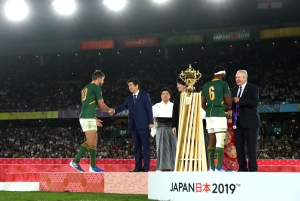
English player running the ball Award Ceremony (Final)
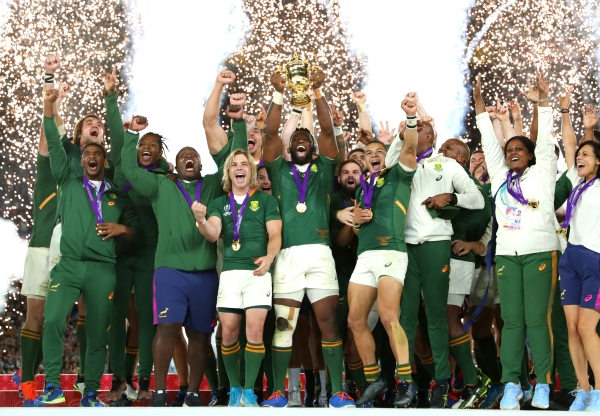
The winning South African team
6 Response to the East Japan Typhoon in 2019
Three pool matches were canceled due to the East Japan Typhoon that struck Japan during the tournament. However, thanks to the prompt and accurate response by the RWC Organizing Committee and the host cities, the Japan-Scotland match was held, and the tournament proceeded without major disruption. In response, World Rugby President Bill Beaumont, who is the organizer of the tournament, said, “I feel that Japan’s response to the extremely challenging disaster of Typhoon Hagibis is a testament to the resilience of the people of this wonderful country and their determination to recover”. Thus, Japan received accolades from everywhere.
7 Volunteer activities supporting the tournament
One of the factors that contributed to the success of the RWC 2019 Japan was the active role played by volunteers. Approximately 13,000 people, who were recruited as volunteers, offered Japanese hospitality by engaging in spectator services at the venue, playing an important role in guiding and entertaining fans who visited the venues from Japan and abroad; VIP support, taking care of receiving guests and guiding them around; and media support, assisting in the activities of domestic and foreign media and broadcasting stations, and also as city and fan zone guides, playing an important role of guiding and entertaining fans by providing information about the city, airports, stations, and the fan zones, etc., in the host cities.
< Photo.>


Volunteers having a meeting


Assisting a fan A high-five with a fan
Section 3 Section 3 Performance of the Japanese National Team
The Japanese team won all the preliminary pools and advanced to the knockout stage for the first time in history. Although the Japanese team unfortunately lost in the quarterfinals to South Africa, the tournament’s winning team, the Japanese team fought fiercely in all their matches. The whole country was filled with excitement and the way the Japanese team fought with all their might until the last match gave the people of Japan dreams and inspiration. In addition to the appeal of rugby itself, a major factor in this excitement was that the national rugby team comprised a multinational group of players from various backgrounds and ethnicities, each of whom played as a single team, making the most of their individuality.
This section reflects on the success of the Japanese national team during the tournament.
1 Preliminary pool Match 1 Japan-RUSSIA


The pre-match ceremony Pieter Labuschagné, an athletic player

Kotaro Matsushima, who played an active role throughout the tournament

Fans cheering for Japan’s victory
2 Preliminary pool Match 2 Japan- IRELAND


Players from both teams enter the pitch Shiro Tanaka, a long-time supporter of the national team

A Japanese player blocks a breakthrough by his opponent
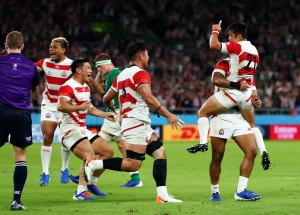
The Japanese team celebrates after winning the match
3 Preliminary pool Match 3 Japan- SAMOA

Lomano Lemeki Lava tries to advance despite being held back by the opponent

Asaeli Ai Valu makes a powerful breakthrough
4 Preliminary pool Match 4 Japan- SCOTLAND

Keita Inagaki, who played an active role with his athleticism

Spectators who helped to enliven the tournament
5 Finals Quarterfinals Japan- SOUTH AFRICA

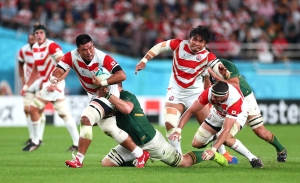
Michael Leitch supported the team as captain Koo Ji-won and others breaking a tackle


A try is conceded to the South African team Group photo after the match
Section 4 Towards the Success of the Tournament
Thanks to the Rugby World Cup 2019 success in Japan, interest in rugby has increased domestically. However, the recognition and popularity of rugby in Japan still needed to improve at the event’s bidding stage. Therefore, MEXT started the “2019 Rugby World Cup Promotion and Awareness Project” in 2014 to make the Rugby World Cup a success, and worked with the Japan Rugby Football Union (JRFU), which is the commissioned public interest incorporated foundation, to promote and raise awareness through the three pillars of “expanding the number of players through after-school rugby,” “popularizing the sport through tag rugby,” and “international exchange through rugby”.
In addition, the trophy was displayed to the public on “Children’s Kasumigaseki Day” as part of the trophy tour. MEXT also collaborated with the Japan Anti-Doping Agency (hereafter referred to as "JADA") to promote and implement anti-doping activities.
Furthermore, under the “Sport for Tomorrow” framework implemented by the Japan Sports Agency in cooperation with public and private sectors, rugby coaches have been dispatched to various Asian countries, and lectures have been held.
This section introduces the initiatives of the local governments that hosted the national teams of other countries as official team camps in addition to the initiatives of MEXT and Japan Sports Agency mentioned above.
1. Dissemination and raising awareness in Japan
(1) After-school rugby program
Rugby classes not involving team activities were held on weekdays, and various entities such as Top League teams, prefectural rugby associations, university rugby clubs, non-profit organizations, etc., have taken the lead. From FY2014 onwards, approximately 10 sessions were implemented in each region for grades 5 and 6 of elementary school to grade 3 of Junior High School in prefectures hosting RWC 2019 Japan or serving as accredited team camp venues. Since there are only a small number of junior high schools with rugby clubs, this project was implemented to improve the vacuum in the junior high school age group by creating a new off-campus club that is not part of club activities to create an environment where children who have been active in local clubs until elementary school can continue to play rugby in the junior high school age group. Many of the programs included basic training that focused on the fun, excitement, and exhilaration of rugby. In a questionnaire to the participants, some said, “I can’t wait to play rugby”, and “I learned basic but important things”, indicating high satisfaction with the program.
The JRFU website introduces similar activities undertaken across Japan to create an environment where rugby can be played on weekdays. Initiatives are being taken to create an environment in which rugby can be played, including the preparation of an operation manual that compiles the know-how and implementation procedures accumulated through the holding of after-school rugby programs for use in the creation of “self-managed classes” planned proactively by local governments and regional rugby associations. These initiatives are ongoing to create an environment for rugby.


Snapshot of the training session Snapshot of the player’s huddle
(2) Dissemination of the World Cup through tag rugby
Tag rugby is a sport that promotes the spread and expansion of rugby competitions to elementary and junior high school students across Japan by replacing tackles with removing two “tags” (strap-like objects) attached to the waist, thus eliminating intense physical contact in the sport. The features of tag rugby include “enjoyable even for someone who is not good at sports,” “safe,” “abundant physical activity,” and “not restricted to any grade or gender.” It is also included in the National Curriculum Standards for elementary and junior high schools because of its ease of incorporation into physical education classes.
A “2019 Rugby World Cup Tag Rugby Promotion and Awareness Guidebook” was created in FY2012 and distributed to about 22,000 elementary and junior high schools nationwide. This includes information on tag rugby’s appeal, methods to introduce tag rugby, and ways to enjoy the sport. In addition, the “Everybody Try! Tag Rugby Guidebook” was prepared for elementary schools and the “Guidebook for Instructors of Tag Rugby” for junior high schools, as well as “Tag Rugby Teacher Training Sessions” for elementary and junior high school teachers and people involved in local lifelong sports to learn about the characteristics of tag rugby, evaluation methods and practical teaching methods. Those who completed the training were issued a "Tag Rugby Teacher Training Course Completion Certificate" by the JRFU. Efforts were made to promote the spread of rugby in school physical education and community sports and to ensure a smooth introduction to school physical education.
By training the coaches, there is a potential for tag rugby to not only teach the values cherished in the rugby community, such as the spirit of “no-side” after the game, the importance of teamwork with friends, and empathy towards opponents but also contribute to the increase in elementary and junior high school students aspiring to become future rugby players.
< Photo.>


Snapshot of the training session Snapshot of the workshop
(3) Public display of Webb Ellis Cup on “Children’s Kasumigaseki Tour Day”
World Rugby hosted a trophy tour featuring the Webb Ellis Cup, a trophy awarded to the winning team at the Rugby World Cup. Twenty countries and regions were toured over 2 years, starting with England in November 2017. This time, the countries and regions visited include Malaysia, India, Nepal, and Chile, where trophies have not been taken before. The final destination was Japan, where the trophy was displayed in various cities and visited local rugby schools, university rugby training camps, and activities such as “Paddy field rugby”.
In August 2019, the trophy was opened to the public as part of the programs of the “Children’s Kasumigaseki Tour Day” (where MEXT and other ministries and agencies collaborate to explain their respective operations and conduct tours of the ministry). A commemorative ceremony was held on the opening day of the exhibition attended by Masahiko Shibayama, the former Minister of Education, Culture, Sports, Science and Technology, Suzuki Daichi, Director General, Japan Sports Agency, Koji Murofushi, Dream Supporter of Rugby World Cup 2019, and Akira Shimazu, CEO of the RWC Organizing Committee, who welcomed the visiting children and enjoyed quizzes with them.

Commemorative ceremony at Children’s Kasumigaseki Tour Day

Snapshot of the commemorative ceremony

Ren and G, the official mascots of the Ruby World Cup who visited as guests


Snapshot of public relations activity
(4) Anti-doping initiatives
The Japan Sports Agency commissioned JADA to implement the “Keep Rugby Clean” campaign at the fan zones as part of its efforts to promote and raise awareness of anti-doping activities among young athletes, spectators, and rugby fans. At the campaign booth, visiting spectators and rugby fans filled in messages about the attractiveness of sports and the power of sports that they felt through the Rugby World Cup to advocate and participate in clean sport.


Snapshot of spectators writing the messages

Snapshot of spectators posing in front of a banner
2 International exchange through rugby
(1) International exchange program through rugby
An international exchange program was implemented as one of the projects in the “2019 Rugby World Cup Promotion and Awareness Project”. The project, which aims to develop international citizens through rugby, includes a dispatch project to New Zealand, which has won three World Cups in the past, for international exchange and an acceptance program to invite students from Pacific island countries that will participate in RWC 2019 Japan, and provides them with opportunities to learn about the legacy of the host country of the tournament while promoting international exchange through rugby.
The dispatch project is a study abroad program to improve English and rugby skills. Every year since 2015, about 10 female high school students from Japan have visited New Zealand, stayed at homestays of New Zealand families, etc., and gained an international perspective while experiencing the culture and traditions. After returning to Japan, participants said that New Zealand had rugby goalposts all over the city, including in parks, and that they were surprised by the environment, which made it possible for everyone to experience rugby casually.
After returning to Japan, a wide range of activities was held, including an English-language speech at a briefing hosted by the New Zealand Embassy, a meeting with New Zealand Prime Minister Jacinda Ardern, and participation in RWC 2019 Japan. These experiences will significantly contribute to the participants’ development as international persons and the promotion of rugby’s future activities and legacy plans for RWC 2019 Japan.
In the acceptance project, five junior high school students from each of the three Pacific island countries (Fiji, Samoa, and Tonga) that participated in RWC 2019 Japan came to Japan in October 2019, and various international exchanges were held in Higashi Osaka City.
During the meeting with Daichi Suzuki, Commissioner of the Japan Sports Agency, Mr. Suzuki showed the gold medal he won at the Seoul Olympics and encouraged the participants to make this program fruitful. After that, students experienced the World Cup as an intimate experience by watching matches at the venue and cheering at the public viewing. They also visited the Kintetsu Liners, a team in the Top Challenge League, and interacted with players who have roots in various countries. In addition to rugby, the students visited two junior high schools in Higashiosaka City, where they experienced judo, cooking practice, calligraphy, and an introduction to Japanese culture in English, expanding the circle of exchange beyond the borders of their generation. Participating students commented that they wanted to come back to Japan, that they wanted to play rugby in Japan, and that they felt Japanese students were respectful and polite to each other. Over 90% of the junior high school students in Higashiosaka City who participated in the exchange program answered, “I became interested in different countries and cultures through this exchange program”. They said, “I didn’t think international exchange could be so much fun. I want to study abroad next time”, and “I want to work harder on my English”.
The exchange program has left behind many things, not only for the students from the three countries but also for the Japanese students who hosted them. The experience gained through this exchange will serve as a legacy for the Rugby World Cup and blossom into a bigger flower in the future.


Group photo of the dispatch project Snapshot of speech at the dispatch project

Snapshot of exchange at the acceptance project

Snapshot of exchange through judo at the acceptance project
(2) Dissemination of rugby competitions in Asian countries
The Japan Sports Agency is also working to promote rugby in the Asian region through “Sport for Tomorrow” (an international exchange and cooperation project through sports promoted by the Japanese government targeting more than 10 million people in 100 countries, including developing countries, in preparation for the Tokyo 2020 Games).
Since 2015, rugby coaches have been dispatched to Asian countries and held lectures and other events in cooperation with the Japan Sport Council (hereinafter referred to as “JSC”), JRFU, and other organizations. In December 2018, in cooperation with Oita Prefecture, a host city of the RWC 2019, and Beppu City, an official team camp, an initiative to promote the realization of a harmonious society in Laos using rugby as a tool was implemented. Workshops and training sessions on tag rugby were held, including tag rugby games with children and adults with and without disabilities, to raise awareness of mutual respect regardless of disabilities. As a result, new ideas were provided to Laos, planning to develop special needs education in the future through learning Japanese special needs education content and tag rugby know-how.
In July 2019, a former Japanese national rugby player, a wheelchair rugby*1 coach, and an expert on sports and gender were sent to India to promote the sport. As part of these efforts, rugby clinics for managers, coaches, and players of teams competing in national tournaments, workshops on wheelchair rugby using a competition wheelchair, and gender seminars to improve the environment for female athletes and support their participation in the sport were conducted. As a result, the spirit of the unique rugby culture, No-Side and One for All, All for One, was also shared, conveying the value and joy of rugby.

Support for people with disabilities through tag rugby in Laos
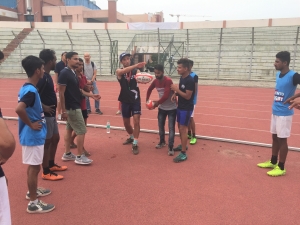

Rugby clinic in India Rugby lessons in India

Gender Seminar in India
3 Initiatives of local governments
Before and during the tournament, various initiatives were taken at venues across the country, such as tournament venues, official team camps, and pre-camp sites, to create an atmosphere and promote international exchange, as shown in the following examples.
(1) Initiatives of Miyako City
Miyako City, which hosted the Fiji and Namibia representative teams as an official team camp, held tag rugby classes at elementary and junior high schools in the city as an initiative to build momentum for the tournament. People from both countries were invited to hold “School Lunch Namibia Day” and “School Lunch Fiji Day” to learn about the international understanding of the two countries and deepen international understanding while learning about their cultures. Interpreters were assigned to foreigners visiting Miyako City for the RWC 2019 in cooperation with the Miyako City International Exchange Association, establishing a system for hospitality.


Tag rugby class Interaction between Namibian team representatives and citizens

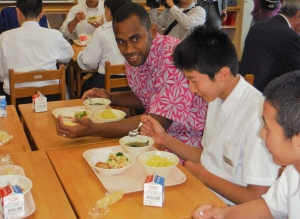
School Lunch Namibia Day School Lunch Fiji Day
(2) Initiatives of Iwata City
Iwata City and Kakegawa City hosted the teams representing Ireland, Russia, and Australia as an official team camp. Players from Yamaha Motor Jubilo, a local team in the Rugby Top League, visited elementary schools in the city as an initiative to build momentum for the tournament and conducted hands-on activities to let children learn the joy of rugby. In addition, in preparation for exchanges between citizens and foreigners visiting Japan during the tournament, a booklet summarizing greetings in four languages was distributed to elementary schools, English conversation classes were held with foreign players of Yamaha Motor Jubilo, and English conversation classes were held at the Exchange Center. During the tournament, events were held in the city center to promote interaction between foreign visitors to Japan and local citizens, including beer gardens, product sales, commemorative photo shoots with ninja and warriors, and a hands-on rugby event where children interacted with the national team players through lineouts, scrums, and pass exchanges.

Rugby exchange between the Australian national team and elementary school students

English conversation class by representatives of Australia


50-Day countdown plan Hospitality for spectators
(3) Initiatives of Beppu City
Beppu City was the venue of the official team camp for players and officials representing New Zealand, Canada, Australia, Wales and England, and held various events to foster momentum for RWC 2019 and invited high school students from overseas sister cities of Beppu City to hold rugby matches for international exchanges, creating opportunities for citizens to experience rugby. During the tournament, an exchange event was held with the participation of players, officials of New Zealand, and about 3,000 citizens. The world-standard playing field and weight training facility built to host the team was used for the Super Rugby Sunwolves training camp after the tournament and has since been used to attract other sustainable teams to the city.

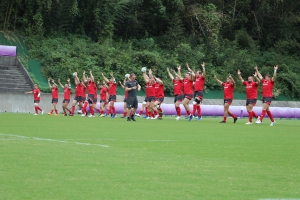
Snapshot of England team training Snapshot of Wales team training


Rugby exchange with sister city Exchange meeting with New Zealand representatives
(4) Initiatives of Kumamoto Prefecture and Kumamoto City
In addition to being the venue for the tournament, Kumamoto Prefecture and Kumamoto City hosted the players and officials of France, Tonga, Wales, and Uruguay as official team camps, disseminated the charm of rugby by holding experiential events and public viewing, etc., in which former Japanese national rugby players were invited two years, one year and 100 days before the tournament was held as a measure to foster the momentum for the tournament. The information was disseminated to residents and overseas in cooperation with Fukuoka Prefecture, Fukuoka City, and Oita Prefecture, also host cities in Kyushu. It included a booth at the Hong Kong Sevens, an event attracting rugby fans worldwide, and promotional activities at the Japan Expo in France. In addition, volunteers were trained for various roles such as medical assistance, interpretation, and guidance two years before the tournament, and preparations were made for the reception system. Kumamoto Prefecture also served as the venue for the 2019 Women’s Handball World Championship, held about one month after RWC 2019 Japan. This volunteer training aimed to acquire a broad attitude as a sports volunteer and support both events. In addition, before the tournament, the government and rugby associations of Wales visited Kumamoto City, held rugby classes, and interacted with children. During the tournament, there were exchanges with the national teams that visited the camp, such as at rugby classes and fan zones. Japanese cultural experiences were held, creating opportunities to interact with the representative players.


Events one year before the tournament Interaction with the Wales national team


Snapshot of France national team camp Volunteers who supported the tournament
Section 5 Legacy of the Competition
1 What Rugby World Cup 2019 brought to Japan
(1) Local revitalization in the host city of the matches
MEXT has been working on rugby promotion and awareness through commissioned projects, such as the Rugby World Cup Promotion and Awareness Project, to contribute to the tournament’s success. Additionally, many host cities implemented initiatives to disseminate and raise awareness about rugby.
Higashiosaka City, one of the tournament’s host cities, has the Hanazono Rugby Stadium, a ground known to be sacred for high school rugby, and is known as one of the leading rugby cities in Japan. The three goals of the bid to host the RWC were to make further use of the rugby field, uncover commercial opportunities to connect with the world and create a bustling city by systematizing tourism policies and building a promotion system.
First, a large-scale renovation was carried out to make the Hanazono Rugby Stadium a stadium that meets the criteria for holding the tournament, which included the establishment of a large outdoor digital display, separation of all seats, maintenance of VIP rooms and lounges, and the renovation of the Rugby Museum. In addition, transportation infrastructure such as railroads and roads have been developed, making reaching neighboring cities and airports more convenient.
In addition, hosting RWC 2019 was an opportunity to strengthen tourism measures to attract more people to the city. A corporation was established to coordinate the steady implementation of this plan. In cooperation with various stakeholders such as the Chamber of Commerce and Industry, restaurants, universities, etc., a strategy was formulated to create tourist areas based on a clear concept. A PR video centered on programs visitors can experience in the city was created to make Higashiosaka known and distributed as an advertisement over social media.
In addition, wheelchair sports were promoted to create a city where everyone can enjoy sports, regardless of disability, age, or gender. In particular, for the Wheelchair Rugby World Challenge 2019, held in Tokyo during RWC 2019 Japan, many spectators visited and attracted attention; Higashiosaka City actively held events and visiting lectures for wheelchair sports.
(2) Increase in the number of foreign tourists visiting Japan as a result of holding RWC 2019
The Japan Tourism Agency (JNTO) created a special website for RWC 2019 Japan to disseminate tourism information from various parts of Japan, mainly the host cities. In addition, overseas media were invited before the games and conducted an inspection trip (familiarity trips) to cover each host city, etc., strived to disseminate Japan’s charm to the world, taking RWC 2019 as an opportunity.
The number of foreign tourists visiting Japan from countries participating in RWC 2019 Japan increased by 29.4% year-on-year in September and October, and many foreigners, including spectators of RWC 2019 Japan, visited Japan. Since the games were held in various parts of Japan, visitors were encouraged to stay in the countryside.

Photo: Special website for RWC 2019
Among foreign visitors to Japan, the per capita travel expenditure of those who watched RWC 2019 Japan is estimated at 385,000 yen, approximately 2.4 times higher than the 159,000 yen of those who did not watch the tournament. By nationality, the expenditures were 386,000 yen for the U.K., 476,000 yen for France, 328,000 yen for the U.S., and 408,000 yen for Australia, all of which were higher than those of travelers of the same nationality who did not watch the matches. Also, when looking at the expenses by category, those who watched the matches tended to spend more than those who did not watch the matches on accommodation, food, drinks, and alcohol, in addition to sports expenses.
【Fig. 1-2-1】Travel expenses for one person per trip to Japan by whether or not they watched the Rugby World Cup

【Fig. 1-2-2】Travel expenses per trip per person for visiting Japan by item and whether or not they watched the Rugby World Cup

(3) International exchange
RWC 2019 Japan promoted various international exchanges inside and outside the venues. After the fierce competition in which the players gave their all, the Japanese audience, together with the visitors to Japan, cheered generously not only for the players representing Japan but also for the excellent play of the players, embodying the spirit of “no side” and praised each other’s good performance. The players responded to the cheering from the audience with Japanese-style bowing, creating an even greater sense of unity at the venues. In addition, a respectful attitude toward the other’s culture, which is also part of the spirit of rugby, such as the welcome with the national anthem and haka at the camps, has been widely communicated overseas.
For the first time in the tournament’s history, matches were canceled due to a typhoon. The Canadian team volunteered to remove sediment and mud in the disaster-affected regions of Kamaishi, spreading emotion and solidarity in areas other than rugby. Furthermore, the international exchange created by this tournament expanded far beyond rugby as volunteers and many other people who welcomed the visitors to Japan came in mutual contact.
(4) Dissemination of the value of rugby and sports
At RWC 2019 Japan, the Japan national team and all the teams participating in the competition received enthusiastic support. This is also reflected in the ticket sales rate of 99.3%. The excitement continued even after the South African national team defeated the Japanese national team, with the Yokohama International Stadium, where the final match was held, recording an attendance of 70,103, breaking the record set during the 2002 FIFA World Cup.
Akira Shimazu, CEO of the Rugby World Cup 2019 Organizing Committee, analyzed that the excitement of the tournament was due to the appeal of the game of rugby, as well as the five values of the game: dignity, passion, unity, discipline, and respect, along with the behavior of the players that resonated with the Japanese people.
2 Efforts to promote rugby in the future
(1) Maintenance of rugby facilities
National interest in rugby and other sports has increased due to RWC 2019 Japan. It is important to utilize this nationwide momentum to disseminate and promote rugby in the future. However, the number of sports facilities in Japan where rugby games can be held is limited. For this reason, as a legacy of RWC 2019 Japan, the “Project to develop sports capable of rugby competition” for sports facilities (public social sports facilities) owned by prefectures and municipalities across the country was included in the FY2019 supplementary budget (budgeted amount of 2 billion yen), and are proceeding with the development. The contents of the maintenance are: (1) new construction and alternation of rugby fields, (2) renovation of existing rugby fields, (3) renovation of existing sports fields so that they can also be used as rugby fields, and the project developed using this budget is positioned as the “Rugby World Cup 2019 Japan Commemorative Project”. By implementing this project, we strive to develop rugby in Japan further by creating opportunities for children and residents to play or come in contact with rugby.


Image when facility maintenance is completed
(2) Holding of stakeholder meetings on the promotion of rugby
RWC 2019 Japan mobilized more than 1.7 million spectators from home and abroad, and the Japanese national team, which received loud cheers from the people, continued to make rapid progress, reaching the final eight for the first time, giving the people of Japan great dreams and inspiration. On December 23, 2019, a “Stakeholders’ Meeting on the Promotion of Rugby” was held to consider further measures to develop Japanese rugby, including strengthening international competitiveness by consolidating the popularity of rugby among the people on the occasion of the tournament. This conference was attended by the Japan Sports Agency, JSC, JRFU, and RWC Organizing Committee, and discussions will continue with the stakeholders for the development of rugby.
3 Towards hosting international competitions by Japan in the future
Various international sporting events are being held in Japan, one after another, starting with RWC 2019 Japan. In 2021, the World Masters Games 2021 Kansai, an international all-round competition for lifelong sports in which anyone aged 30 or older can participate, and the Tokyo 2020 Olympic and Paralympic Games *2will be held in Tokyo. MEXT and the Japan Sports Agency will continue to cooperate to the fullest extent to reflect the knowledge gained at these upcoming international competitions in terms of operations, etc., to contribute to the success of each competition.
Column2
Volunteering for the Rugby World Cup
About ten years ago, my second son, who was in the 3rd grade of elementary school and getting into trouble with his mischievous behavior, picked up rugby after being praised for knocking people over. He is now in his fourth year of university and says he will continue playing rugby. As a mother, I feel exasperated and wonder, “Is he still going to keep playing that sport?” but I am endlessly grateful for his encounter with rugby.
Rugby is a 15-player game in which the players take on the unreasonable mission of carrying an unstable oval-shaped ball forward without throwing it. The team that successfully fosters and combines individual strengths like weight, height, speed, kicking ability, dexterity, smarts, and seriousness wins.
As the phrase One Team symbolizes, a team cannot function without diverse individuals. Therefore, teammates respect their companions and put their bodies on the line for them. They are inevitably close companions. I believe the 2019 Japanese national team truly embodied the appeal of rugby.
As a resident of Fukushima, I decided to volunteer at Kamaishi from the moment it was decided to host some of the matches. It is a rugby-obsessed town and home to Nippon Steel Kamaishi, a team that won seven consecutive Japan Championships and was affected by the Great East Japan Earthquake. I wanted to connect with the town’s air, sea, mountains, and people through rugby.
On September 25, the day of the Fiji vs. Uruguay match, I managed the volunteer waiting room. The manager told me, “You can’t entertain the audience if you don’t have fun, so start with a smile!”. Only those who truly understand the significance and feelings of volunteering can take this stance. I did not expect the management side to build a flat and open relationship with volunteers and have such trust in us. I want to express my sincere gratitude and respect to them!
The cheers that resounded from the stadium conveyed the excitement of the game. The delighted smiles of the volunteers returning to take their break, the smoke trails drawn against the blue sky by the Blue Impulse team, and the big fishing flags all seemed to be celebrating Kamaishi. I couldn’t watch the game, nor could I even get into the venue. Nevertheless, I was happy to be involved in this tournament as a volunteer. I repeatedly breathed in the fresh, clear air that everyone probably shared by everyone who was there.
The Namibia vs Canada match was on October 13. The typhoon shattered any hopes of having that dream-like time again. We could not hold the tournament amid landslides, roads being cut off, and shelters being opened. Even though I knew that canceling the match was right, my emotions could not be easily controlled. I felt frustrated and sad when I saw the faces of the people of Kamaishi who had worked hard to prepare for the event.
When I visited the town after the rain, I saw many citizens had begun to shovel the mud. And to my surprise, the players of the Canadian team were doing the same as if nothing had happened. I was ashamed of hanging on to the cancellation for so long. When times are tough, they work together with their friends, talk to each other, crack jokes, laugh, and get through it. Even when injured, they don’t sit around feeling depressed but wait for the right time and get back on their feet. The rugby players were carrying the mud effortlessly with their thick arms. Oh, I felt so glad to have come to Kamaishi after all. Whether it’s a sunny day or a typhoon day, rugby is still the perfect sport for Kamaishi. And I, too, liked rugby after all. I am truly grateful to have had this opportunity to be involved as a volunteer.

(Written by Michiko Saito, Secretary General of Utsukushima Sports Routers, a non-profit organization)
*1 Wheelchair rugby: A wheelchair competition for people with limb impairments. This has been an official event since the Sydney Paralympics in 2000.
*2 On March 30, 2020, it was decided that the Tokyo Olympic Games would be held from July 23 to August 8, 2021 and the Tokyo Paralympic Games would be held from August 24 to September 5 of the same year.
お問合せ先
Education Policy Bureau Policy Division